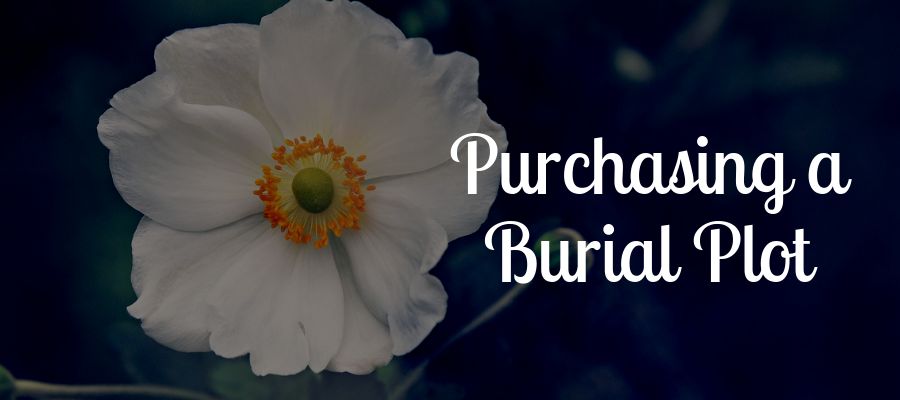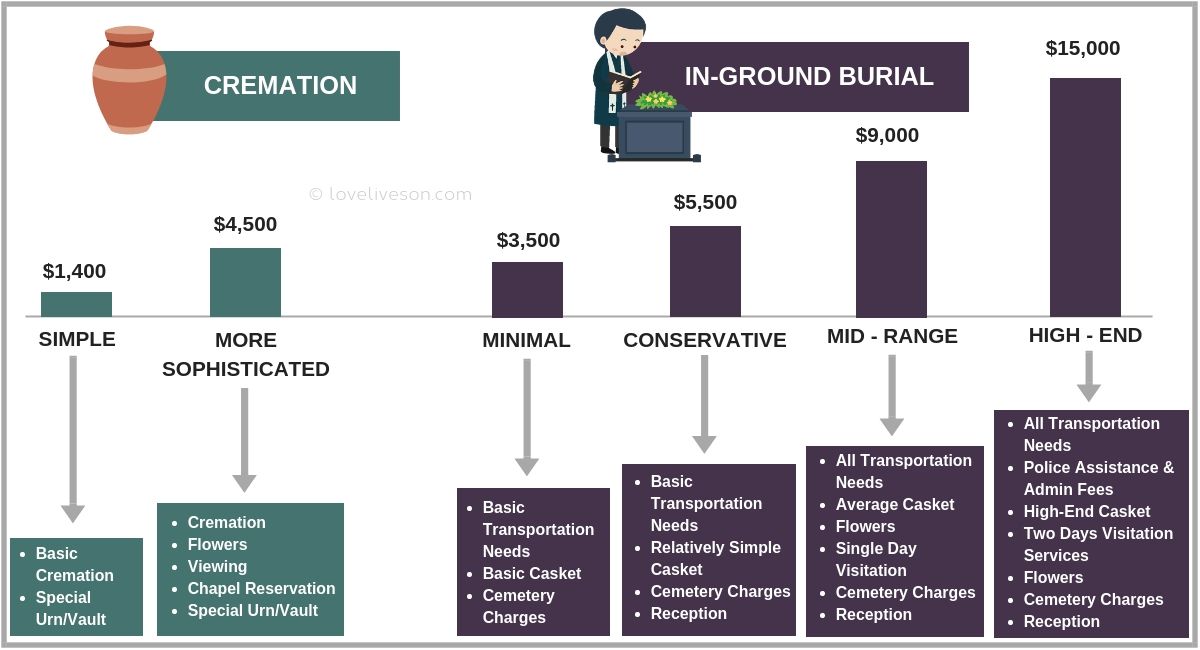
If you are planning a burial of a coffin or casket, or planning to bury cremated remains, there are a number of options to consider before you start looking for a plot.
Purchasing a burial plot, like any other real estate transaction, comes with issues that should be addressed before you sign a purchase contract with a cemetery or a funeral establishment.
This article will cover everything that you and your family need to know about burial plots, including the different options available, the average cost, and other practical considerations (like religion).
We will also give you 8 steps you must follow when purchasing a burial plot to ensure that you aren’t locked into an unfair contract.
Types of Burial Plots
There are four types of ground plots in a cemetery:
- Single Burial Plots: A single plot will accommodate one person in a casket. This is the most common type of cemetery plot.
- Companion Burial Plots: Two plots that are sold together in order to accommodate a couple, usually a married couple, are referred to as companion plots. The two plots are either side-by-side, or a single plot in which the caskets are stacked (often referred to as “double depth”). Double depth plots are usually more affordable than side-by-side companion plots, as only one large outer burial container is usually required, instead of two.
- Family Burial Plots: As the name suggests, a family plot is a grouping of plots that are reserved for members of the same family. A family may purchase a certain area within the cemetery, (the area usually has a single large headstone engraved with the family name, along with smaller headstones for individual graves), or the family may purchase a row of single plots that are side-by-side.
- Burial Plots for Cremated Remains: Cremated remains may be buried in a standard cemetery plot alongside buried caskets. Many cemeteries allow multiple urns with cremated remains to be buried in a single burial plot because they are smaller in size than a casket.
Some cemeteries have a special area for cremated remains, which is sometimes referred to as an urn garden. Plots in an urn garden are usually smaller than a standard sized plot, which could translate into a significant cost saving. Some urn gardens are elaborately landscaped, with beautiful water features and benches to sit on, while others are simple in their presentation. You will have to check if the cemetery requires you to purchase a small outer burial container for the urn.
Average Cost of a Burial Plot
The average cost of a burial plot is dependent on several factors, including the location of the cemetery, (urban
cemeteries are more expensive than rural cemeteries), whether it is a public cemetery or a private cemetery, (private is more expensive), the type of cemetery plot, the location of the plot within the cemetery itself, and whether the plot was purchased individually or as part of a family package.
Generally speaking, the average cost of a plot is as follows:
- A burial plot in a public cemetery: The average cost for a single burial plot is $200 to $2,000. Rural cemeteries fall within the lower end of the range, while urban cemeteries are in the upper end of the range, as land is at a premium. Plots for infants and children are less expensive.
- A burial plot in a private cemetery: The average cost of a single burial plot is $2,000 to $5,000, depending on where the cemetery is located, the cemetery’s amenities, and whether the plot is in a more desirable section within the cemetery. As with public cemeteries, infant and child burial plots are less expensive than adult burial plots. In densely populated urban areas, a burial plot in a private cemetery can skyrocket up to $25,000 for a single burial plot, and up to $50,000 or higher for a double depth plot.
- A burial plot for cremated remains in a public cemetery: The average cost for burying cremation ashes in a public cemetery is $350 to $500.
- A burial plot for cremated remains in a private cemetery: The average cost for burying cremation ashes in a private cemetery is $1,000 to $2,500.
Additional Costs Associated with Burial Plots
In addition to the cost of the burial plot, there are other costs that need to be considered:
- Grave marker: The average cost will depend on the type of material that is used to construct the grave marker and how elaborate the design is. The average cost of a simple flat granite grave marker is $300 to $800, while the average cost of an upright monument is $1,000 to $3,000.
- Grave liner or burial vault: A private cemetery may require you to purchase a grave liner or a burial vault to protect the casket once it has been buried. The average cost is $400 to $5,000, depending on the material the liner or vault is constructed from.
- Interment fees: These are the fees that cemeteries charge to open and close the grave, to replace the sod, and to complete paperwork required for legal records. The average cost of interment fees in a public cemetery is $350 to $1,000, but in a private cemetery, $600 to $3,000. If you are considering purchasing family plots, interment fees become a very important consideration. In some cemeteries, these fees can exceed the cost of the family plots themselves.
- Burial permit: In some jurisdictions, a burial permit is required to bury, cremate or otherwise dispose of the body of a deceased person. Here, a cemetery will not consent to a burial without a burial permit. There may be a small fee to obtain a burial permit (i.e. less than $20). Check with your local government or a funeral home director as to whether you need a burial permit and for details on how to obtain one.

Related Articles

Other Things to Consider Before Purchasing Burial Plots
There are other factors that you should consider before purchasing a burial plot:
- Cemetery bylaws: Each cemetery has its rules and regulations on what is permitted and not permitted in the cemetery. The by-laws will govern what type of grave marker is permitted, whether cemetery staff or the deceased’s family are responsible for maintaining the grave, what can be planted around the grave, and what types of personal memorials or decorations can be placed on the grave. Some cemeteries even have restricted visiting hours.
- Cemetery exclusivity: The smaller or the more exclusive a cemetery is, the harder it is to buy your preferred plot. You will need to plan ahead to ensure that you and your family secure a plot in the desired location.
- Cemetery expansion plans: Be sure to ask the cemetery about any expansion plans they may have in the foreseeable future. Their expansion plans may impact your choice of burial plot location within the cemetery.
- Purchasing options: You can purchase a new burial plot by contacting the cemetery itself or through a funeral home, or you can purchase a pre-owned burial plot by hiring a cemetery property re-sale broker, or by reading newspaper advertisements. Pre-owned burial plots are put on the market when people who purchased a plot in advance (usually so that they could be buried near other family members) run into financial difficulties or move out of the area. Pre-owned plots are usually sold at discounted prices. But before you buy a pre-owned burial plot, you should conduct all the same research as you would with a new plot (for example, how much the cemetery charges for interment fees and grave maintenance).
- Religion: The religious aspects of choosing a cemetery can be straightforward in some cases, but difficult in others. With companion plots, it can be difficult if you and your spouse or life partner have different faiths. The same goes for family plots when family members have different faiths. Some cemeteries are very strict when it comes to the faith of the deceased, while others are more accommodating. Gay couples of different faiths often have the hardest time finding a cemetery under religious ownership that will accommodate them.Here is a brief overview of what you could expect in relation to the following faith based cemeteries.
- Christian cemeteries: These cemeteries range from very relaxed to very strict when it comes to rules about the faith of the deceased person. Cemeteries owned by conservative churches will not bend the rules to accommodate an interfaith couple, while cemeteries owned by progressive churches are likely to do so.
- Jewish cemeteries: You will most likely need to provide proof that either you or your spouse is Jewish before you can purchase a burial plot in a Jewish cemetery. A letter from a Rabbi may be sufficient. However, you should note that you might have difficulty obtaining a letter if you haven’t been active in the religious community. Also, not all Rabbis are recognized as having status, so you will need to check which Rabbi has the necessary authority to provide the proof that you need. As with Christian churches, there are different levels of progressiveness when it comes to Jewish Synagogues, and you will have a better chance of gaining acceptance if you choose a progressive Jewish Cemetery than if you try to gain entry into a conservative one (i.e. Hassidic cemetery).
- Muslim cemeteries: Many Muslim cemeteries are very strict and do not allow non-Muslims to be buried there, even if you are the wife of a Muslim. They do, however, make exceptions for the burial of children (adult or otherwise) of a Muslim man and a non-Muslim woman.
- Sectioned cemeteries: A sectioned cemetery is one where there are different sections for different denominations. This type of cemetery is growing in popularity because of increased religious tolerance and acceptance.
Steps for Buying a Burial Plot
There are several steps that you should follow when looking for a burial plot for either yourself, your family, or for a loved one who has recently passed away.
- Step 1: Create a short-list of cemeteries you are interested in: The family’s personal preferences and budget, as well as the number and size of plots that are available, often dictate this decision.
- Step 2: Check their license status: State or provincial governments are usually responsible for the licenses of cemetery managers. Therefore, check with your state or provincial government if the cemetery manager is fully licensed and in good standing. You should also check with consumer affairs if there have been complaints lodged against the cemetery managers.
- Step 3: Do online research: See if the cemeteries you are interested in have a website with maps detailing which burial plots are still available for purchase. You should also check reviews of the cemetery posted by other families. For example, are they satisfied with the maintenance of the cemetery? Are there expansion plans that families are concerned about? What rules does the cemetery have in relation to religion?
- Step 4: Visit the burial plots you are interested in: You should not purchase a burial plot without first inspecting the cemetery and the plot’s location. For example, is the cemetery well maintained? Is the burial plot you are considering purchasing near a maintenance shed or a busy road? (If the answer is yes, your family might not be able to visit the grave in peace.) After you have viewed a few burial plots, you will be able to choose one that best fits your checklist.
- Step 5: Ask the cemeteries for a complete list of costs: As mentioned previously, you want to make sure that you consider all of the costs associated with purchasing a burial plot. You should request from each cemetery a complete price list, including the cost for the burial plot, interment fees, and future maintenance charges, so that you are fully informed and are able to compare prices. Just like with other types of real estate, you can usually save money by forgoing a view or a prime location.
- Step 6: Obtain a copy of the cemetery bylaws: For the cemeteries that you are interested in, obtain a copy of the cemetery bylaws. You will need to make sure that these rules and regulations are not going to interfere with your wishes. You also need to take particular notice of whether cemetery staff or you and your family are responsible for maintaining the grave plot. If you and your family are responsible for maintenance, you need to consider whether this is a realistic proposition, especially if you and your family do not live close to the cemetery.
- Step 7: Check if a discount is available: If you are planning the burial of a loved one who has recently passed away, or are purchasing a burial plot for yourself and have pre-paid your funeral, check with the funeral home that you are working with to see if they are affiliated with a particular cemetery and are able to offer you a discount.
- Step 8: Consult a property lawyer before signing a purchase agreement: As with the purchase of any real estate, you should consult a property lawyer before signing a purchase agreement. He or she will review the cemetery by-laws with you, as well as ensure that your interests are protected in the purchase agreement.
This is especially needed if you are considering pre-purchasing burial plots. When it comes to a pre-need trust contract (or agreement), your lawyer should consider issues such as:
- The installment plan: If you can’t prepay the full cost of a burial plot at the time of purchase, most cemeteries will allow you to pay on an instalment plan. Five-year instalment plans are common, though the number of years will be is determined by the contract. If you will be paying on an instalment plan, your lawyer will need to check if there are any hidden fees and charges associated with the plan, for example: if interest is being charged and at what rate; or if penalties are charged for late payments.
- The trust plan: The money that you pay for the burial plot, either in a lump sum or on an instalment plan, will go into a trust fund administered by the cemetery or a funeral establishment. Your lawyer will want to make sure that the fund will increase in value so that future costs are covered. He or she will investigate where the money is being invested and who the trustees are. Your lawyer will also check the preneed trust contract for written provisions on what will happen to any earnings that are left over after the funeral expenses are paid.
- Cancellation clause: Your lawyer will ensure that your contract includes a clause that allows you to change your mind and cancel the contract and get a refund. Your lawyer needs to check if there are any fees associated with cancelling the contract (usually referred to as a revocation fee) and how this fee is to be paid (for example, only from the trust fund earnings).
- Guaranteed price plan: In order to protect you and your family from future price increases, the pre-need trust contract should include a guaranteed price plan. Without it, your survivors may have to make up any difference in cost, which could be significant. However, even with a guaranteed price plan, some items or services will probably have to be paid at the time of need. For example, the costs associated with opening and closing the grave. There may also be extra fees associated with opening and closing double depth burial plots. When items and services don’t fall within the guaranteed price plan, your lawyer should ensure that you have a written estimate of these additional future charges so that your family knows what to expect.
- Transfers: Your lawyer should check if the contract allows you to transfer to another funeral establishment or another cemetery should you move, or, in the alternative, if the cemetery is willing to buy the burial plot back for the full price that you paid.
- Constructive delivery: To guarantee the prices of costly cemetery products, such as a vault or a grave marker, your lawyer may recommend that they are purchased and stored at the cemetery until they are needed. This is called “constructive delivery”. In this event, your lawyer should ensure that the contract specifies the manufacturer and model number of the items that you have purchased, along with a detailed description of the materials used, and the exact inscription that should appear on the grave marker. The contract should also include the address where the goods will be stored.

Additional Resources
Did you know that Love Lives On has a comprehensive library of articles on funeral planning, grieving, and celebrating your loved one’s life in unique ways?
Here are some other popular posts on our website:
- Practical tips for what to wear to a funeral
- Learn about the 5 stages of grief and how to cope
- Best examples to inspire you when writing a eulogy
- 100+ celebration of life ideas
- 150+ funeral poems to personalize a loved one’s service
Have We Lost the Plot?
Pun intended…
Do you have extra tips on buying burial plots? We would love to have your feedback. Click on the comments box below to let us know what you think.
If you found this post on buying burial plots helpful, subscribe to our YouTube channel for more practical resources, expert interviews & inspiring ideas.
You can also follow our Pinterest board for more on cemeteries and burial plots.




